Unit 3 翻译的方法
Unit3词汇及翻译

Unit 31.There are aways people who dream to make a(n) from gambling(赌博),even though they know the chances are slim(苗条的、微小的).总有一些人梦想着从赌博中发财,即使他们知道机会很渺茫。
young because he couldn’t work out easy mathematical(数学的) calculations(计算)在发明家托马斯·爱迪生小的时候,被视为是一个傻孩子,因为他连简单的数学运算都算不出来。
犯罪嫌疑人) for about two days before they finally caught him in a deserted warehouse(仓库).警察追赶抢劫嫌疑犯大约两天之后,他们终于在一个废弃的仓库里抓到了他。
运动、活动) to raise money for the girl who has caught a rare(rare) disease(疾病).地方报社开展了一个为患有稀有疾病的女孩捐款活动。
5.Rock climbing is attractive(有吸引力的) especially to young peoplebecause it is always with hardship(困难) and adventure.攀岩是具有吸引力的,尤其是对年轻人来说,因为它总是伴随着困难和冒险。
6.The face value(面值) of the bill(账单、钞票(内在的) value is nothing but that of a piece of paper.该票据面值为一美元,但其内在价值只是一张纸。
7.Having won several championships in international matches recently,hecurrently(目前among the world’s professional tennis players.在最近的国际比赛中赢得了几次冠军,他目前在世界上职业网球选手中排名第二。
大学英语第三册UNIT3全文翻译对照

The land of the lock1. Years ago in American, it was customary for families to leave their doors unlocked, day and night. In this essay, Greene regrets that people can no longer trust each other and have to resort to elaborate security system to protect themselves and their valuables.Although the author is writing his opinion, he uses many examples to reinforce his ideas and to prove his thesis.几年前在美国,许多美国家庭的门通常都是日夜不上锁的。
在本文中,格林遗憾地指出人们已经不再彼此信任,不得不求助于各种复杂的安全设备来保护自身及其贵重物品。
作者在提出自己观点的同时,举出了大量的事例来证实和强调自己的观点;2. In the house where i grow up, it was our custom to leave the front door on the latch at night. I don't know if that was a local term or if is universal;"on the latch"meant the door was closed but not locked . None of us carried keys the last one in for the evening would close up,and that was it. 在我长大成人的家里,我们的习惯是晚上把前门闩上。
Unit3小学英语六年级上册课文翻译知识点

Unit3小学英语六年级上册课文翻译知识点六年级新生对英语学习的兴趣非常大,要想方设法维持学生对英语的好奇和兴趣,下面是小偏整理的Unit3小学英语六年级上册课文翻译知识点,感谢您的每一次阅读。
Unit3小学英语六年级上册课文翻译知识点一、主要单词:tomorrow明天film电影supermarket超市trip旅行tonight在今晚evening晚上/傍晚nextweek下周comic连环画杂志dictionary 词典word单词postcard明信片visit拜访二、习惯搭配:takeatrip去旅行goforapicnic去野餐gotothecinema去看电影learntoswim学习游泳visitmygrandparents看望我(外)祖父母gettogether聚会gotothesupermarket去超市goice-skating去滑冰makeasnowman堆雪人seeafilm看电影makemooncakes做月饼readapoem朗诵一首诗thisweekend这周末RenminPark人民公园nextweek下周thismorning/afternoon/evening今天上午/下午/晚上nextWednesday下星期三三、惯用表达式:Whataboutyou?你呢?Heretheyare!它们在这儿!CanIhelpyou?我能帮助你吗?Soundsgreat!听起来很棒!Haveagoodtime!玩得开心!Youtoo.你也是四、公式化句型:1、询问对方打算做什么的句型及其答语:问句:Whatareyougoingtodo+其它?你/你们···打算做什么?nextweektonighttomorrowthismorning/afternoon/eveningt hisweekend...答语:I’m/We’regoingto+动词(短语)原形+其它.我/我们打算···。
高中英语 必修一 unit3 workbook 课文翻译

One of the most popular sports of the Winter Olympic Games is skiing. Skiers compete in the downhill and slalom (回转赛),and in the short and long cross-country ski races. Skiing was originally a sport played only in cold northern countries, but now athletes from all over the world compete in this sport, even those from countries without any snow!
COOL COLD SPORTS
炫酷的冬季运动
The Winter Olympic Games are not just an opportunity for athletes to win medals and honour for their countries. Every four years, the Games also offer audiences a chance to get to know more about winter sports from around the world. The Winter Olympics may not have the large crowds and huge stars of its summer sibling, but they share the same Olympic spirit.
2020新译林版高中英语选修第一册unit3课文翻译(英汉对照)
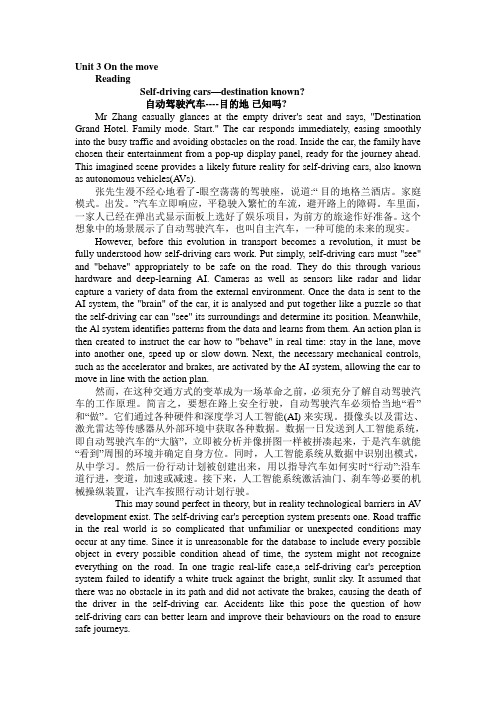
Unit 3 On the moveReadingSelf-driving cars—destination known?自动驾驶汽车----目的地已知吗?Mr Zhang casually glances at the empty driver's seat and says, "Destination Grand Hotel. Family mode. Start." The car responds immediately, easing smoothly into the busy traffic and avoiding obstacles on the road. Inside the car, the family have chosen their entertainment from a pop-up display panel, ready for the journey ahead. This imagined scene provides a likely future reality for self-driving cars, also known as autonomous vehicles(A Vs).张先生漫不经心地看了-眼空荡荡的驾驶座,说道:“目的地格兰酒店。
家庭模式。
出发。
”汽车立即响应,平稳驶入繁忙的车流,避开路上的障碍。
车里面,一家人已经在弹出式显示面板上选好了娱乐项目,为前方的旅途作好准备。
这个想象中的场景展示了自动驾驶汽车,也叫自主汽车,一种可能的未来的现实。
However, before this evolution in transport becomes a revolution, it must be fully understood how self-driving cars work. Put simply, self-driving cars must "see" and "behave" appropriately to be safe on the road. They do this through various hardware and deep-learning AI. Cameras as well as sensors like radar and lidar capture a variety of data from the external environment. Once the data is sent to the AI system, the "brain" of the car, it is analysed and put together like a puzzle so that the self-driving car can "see" its surroundings and determine its position. Meanwhile, the Al system identifies patterns from the data and learns from them. An action plan is then created to instruct the car how to "behave" in real time: stay in the lane, move into another one, speed up or slow down. Next, the necessary mechanical controls, such as the accelerator and brakes, are activated by the AI system, allowing the car to move in line with the action plan.然而,在这种交通方式的变革成为一场革命之前,必须充分了解自动驾驶汽车的工作原理。
2020新译林版高中英语选修第二册unit3课文翻译(英汉对照)

Unit3Helping people帮助他人ReadingThe United Nations—bringing people together联合国——把人们团结在一起In1945,the world was on its knees.Cities lay in ruins,economies were destroyed,tens of millions of people were killed,and families across the globe were homeless and mourning the loss of loved ones.World War II,the deadliest human conflict of all time,had shattered people’s lives everywhere.From the ashes of this utter destruction rose the organization that we now know as the United Nations(UN), offering hope to a world desperate for lasting peace and security.It is my privilege and pleasure to stand before you today and share with you a little bit about this wonderful organization.1945年,世界陷入了困境。
城市成为废墟,经济被摧毁,数千万人丧生,全球各地的家庭无家可归,哀悼失去的亲人。
第二次世界大战是有史以来最致命的人类冲突,它摧毁了世界各地人民的生活。
从这场彻底毁灭的灰烬中诞生了我们现在所知的联合国,它为渴望持久和平与安全的世界带来了希望。
今天,我很荣幸也很高兴站在你们面前,与你们分享一些关于这个了不起的组织的情况。
人教版2019 英语必修三 Unit 3 Diverse Cultures 课文翻译
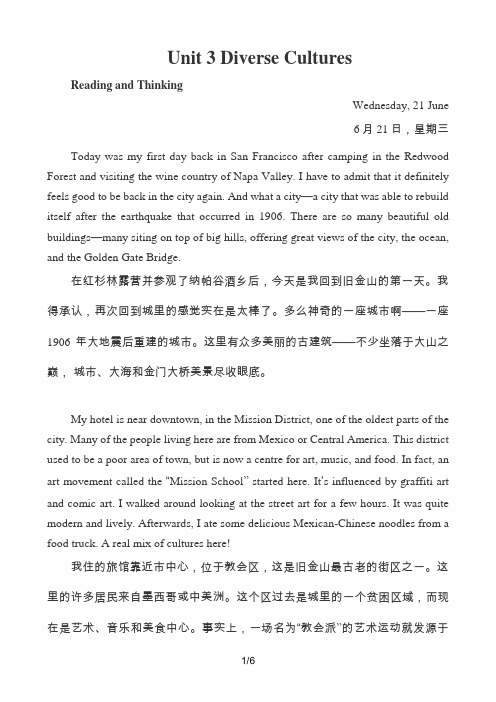
Unit 3 Diverse CulturesReading and ThinkingWednesday, 21 June6月21日,星期三Today was my first day back in San Francisco after camping in the Redwood Forest and visiting the wine country of Napa Valley. I have to admit that it definitely feels good to be back in the city again. And what a city—a city that was able to rebuild itself after the earthquake that occurred in 1906. There are so many beautiful old buildings—many siting on top of big hills, offering great views of the city, the ocean, and the Golden Gate Bridge.在红杉林露营并参观了纳帕谷酒乡后,今天是我回到旧金山的第一天。
我得承认,再次回到城里的感觉实在是太棒了。
多么神奇的一座城市啊——一座1906年大地震后重建的城市。
这里有众多美丽的古建筑——不少坐落于大山之巅,城市、大海和金门大桥美景尽收眼底。
My hotel is near downtown, in the Mission District, one of the oldest parts of the city. Many of the people living here are from Mexico or Central America. This district used to be a poor area of town, but is now a centre for art, music, and food. In fact, an art movement called the “Mission School” started here. It’s influenced by graffiti art and comic art. I walked around looking at the street art for a few hours. It was quite modern and lively. Afterwards, I ate some delicious Mexican-Chinese noodles from a food truck. A real mix of cultures here!我住的旅馆靠近市中心,位于教会区,这是旧金山最古老的街区之一。
文学翻译unit 3《翻译方法:如何选择词义》
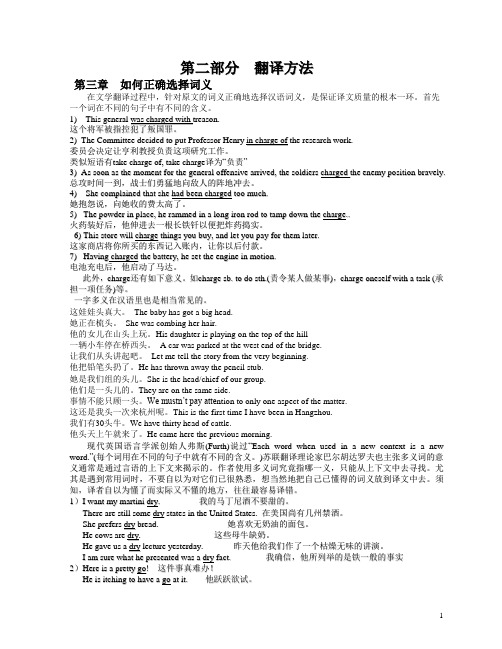
第二部分翻译方法第三章如何正确选择词义在文学翻译过程中,针对原文的词义正确地选择汉语词义,是保证译文质量的根本一环。
首先一个词在不同的句子中有不同的含义。
1)T h i s g e n e r a l w a s c h a r g e d w i t h t r e a s o n.这个将军被指控犯了叛国罪。
2)T h e C o m m i t t e e d e c i d e d t o p u t P r o f e s s o r H e n r y i n c h a r g e o f t h e r e s e a r c h w o r k.委员会决定让亨利教授负责这项研究工作。
类似短语有t a k e c h a r g e o f,t a k e c h a r g e译为“负责”3)A s s o o n a s t h e m o m e n t f o r t h e g e n e r a l o f f e n s i v e a r r i v e d,t h e s o l d i e r s c h a r g e d t h e e n e m y p o s i t i o n b r a v e l y.总攻时间一到,战士们勇猛地向敌人的阵地冲去。
4)S h e c o m p l a i n e d t h a t s h e h a d b e e n c h a r g e d t o o m u c h.她抱怨说,向她收的费太高了。
5)T h e p o w d e r i n p l a c e,h e r a m m e d i n a l o n g i r o n r o d t o t a m p d o w n t h e c h a r g e..火药装好后,他伸进去一根长铁钎以便把炸药捣实。
6)T h i s s t o r e w i l l c h a r g e t h i n g s y o u b u y,a n d l e t y o u p a y f o r t h e m l a t e r.这家商店将你所买的东西记入账内,让你以后付款。
译林版四年级下册 Unit3(含中文翻译)
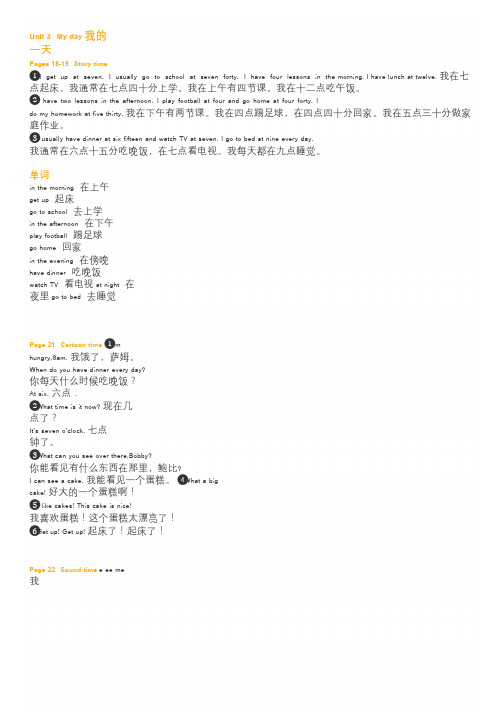
Unit 3 My day 我的一天Pages 18-19 Story time❶I get up at seven. I usually go to school at seven forty. I have four lessons in the morning. I have lunch at twelve. 我在七点起床。
我通常在七点四十分上学。
我在上午有四节课。
我在十二点吃午饭。
❷I have two lessons in the afternoon. I play football at four and go home at four forty. Ido my homework at five thirty. 我在下午有两节课。
我在四点踢足球,在四点四十分回家。
我在五点三十分做家庭作业。
❸I usually have dinner at six fifteen and watch TV at seven. I go to bed at nine every day.我通常在六点十五分吃晚饭,在七点看电视。
我每天都在九点睡觉。
单词in the morning 在上午get up 起床go to school 去上学in the afternoon 在下午play football 踢足球go home 回家in the evening 在傍晚have dinner 吃晚饭watch TV 看电视 at night 在夜里 go to bed 去睡觉Page 21 Cartoon time ❶I’mhungry,Sam. 我饿了,萨姆。
When do you have dinner every day?你每天什么时候吃晚饭?At six. 六点.❷What time is it now? 现在几点了?It’s seven o’clock. 七点钟了。
❸What can you see over there,Bobby?你能看见有什么东西在那里,鲍比?I can see a cake. 我能看见一个蛋糕。
八上Unit 3 课文翻译
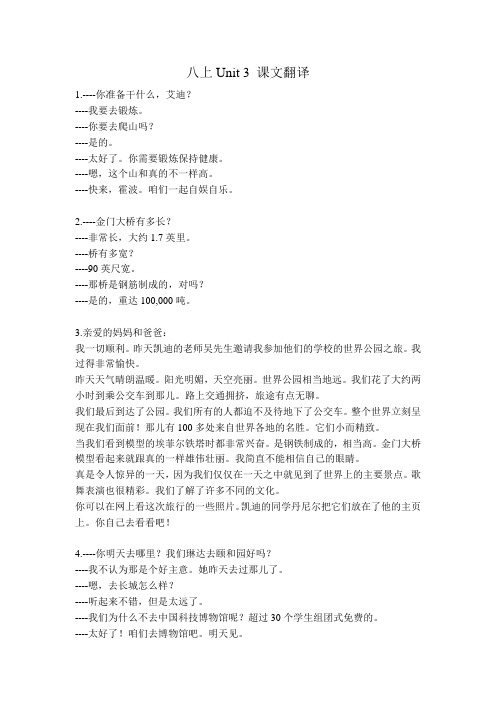
八上Unit 3 课文翻译1.----你准备干什么,艾迪?----我要去锻炼。
----你要去爬山吗?----是的。
----太好了。
你需要锻炼保持健康。
----嗯,这个山和真的不一样高。
----快来,霍波。
咱们一起自娱自乐。
2.----金门大桥有多长?----非常长,大约1.7英里。
----桥有多宽?----90英尺宽。
----那桥是钢筋制成的,对吗?----是的,重达100,000吨。
3.亲爱的妈妈和爸爸:我一切顺利。
昨天凯迪的老师吴先生邀请我参加他们的学校的世界公园之旅。
我过得非常愉快。
昨天天气晴朗温暖。
阳光明媚,天空亮丽。
世界公园相当地远。
我们花了大约两小时到乘公交车到那儿。
路上交通拥挤,旅途有点无聊。
我们最后到达了公园。
我们所有的人都迫不及待地下了公交车。
整个世界立刻呈现在我们面前!那儿有100多处来自世界各地的名胜。
它们小而精致。
当我们看到模型的埃菲尔铁塔时都非常兴奋。
是钢铁制成的,相当高。
金门大桥模型看起来就跟真的一样雄伟壮丽。
我简直不能相信自己的眼睛。
真是令人惊异的一天,因为我们仅仅在一天之中就见到了世界上的主要景点。
歌舞表演也很精彩。
我们了解了许多不同的文化。
你可以在网上看这次旅行的一些照片。
凯迪的同学丹尼尔把它们放在了他的主页上。
你自己去看看吧!4.----你明天去哪里?我们琳达去颐和园好吗?----我不认为那是个好主意。
她昨天去过那儿了。
----嗯,去长城怎么样?----听起来不错,但是太远了。
----我们为什么不去中国科技博物馆呢?超过30个学生组团式免费的。
----太好了!咱们去博物馆吧。
明天见。
外研版九年级上册英语Module3Unit3部分课文翻译
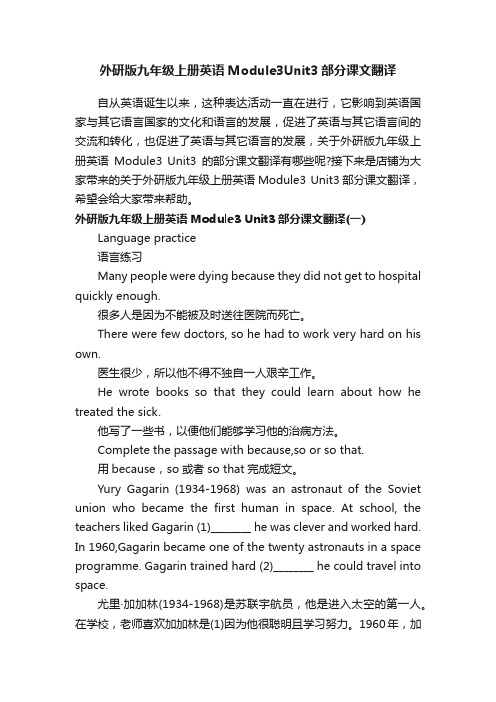
外研版九年级上册英语Module3Unit3部分课文翻译自从英语诞生以来,这种表达活动一直在进行,它影响到英语国家与其它语言国家的文化和语言的发展,促进了英语与其它语言间的交流和转化,也促进了英语与其它语言的发展,关于外研版九年级上册英语Module3 Unit3的部分课文翻译有哪些呢?接下来是店铺为大家带来的关于外研版九年级上册英语Module3 Unit3部分课文翻译,希望会给大家带来帮助。
外研版九年级上册英语Module3 Unit3部分课文翻译(一) Language practice语言练习Many people were dying because they did not get to hospital quickly enough.很多人是因为不能被及时送往医院而死亡。
There were few doctors, so he had to work very hard on his own.医生很少,所以他不得不独自一人艰辛工作。
He wrote books so that they could learn about how he treated the sick.他写了一些书,以便他们能够学习他的治病方法。
Complete the passage with because,so or so that.用because,so或者so that完成短文。
Yury Gagarin (1934-1968) was an astronaut of the Soviet union who became the first human in space. At school, the teachers liked Gagarin (1)________ he was clever and worked hard. In 1960,Gagarin became one of the twenty astronauts in a space programme. Gagarin trained hard (2)________ he could travel into space.尤里·加加林(1934-1968)是苏联宇航员,他是进入太空的第一人。
人教版必修三英语 Unit 3 百万英镑 Act,scene 3,scene 4课文加翻译

人教版必修三英语Unit 3 课文加翻译Unit 3 THE MILLION POUND BANK NOTE百万英镑Act I, Scene 3第一幕,第三场NARRA TOR: 旁白:It is the summer of 1903. Two old and wealthy brothers, Roderick and Oliver, have made a bet. 1903年的夏天,一对老年又富有的兄弟,罗德里克和奥利弗,打了一个赌。
Oliver believes that with a million pound bank note a man could survive a month in London. 奥利弗认为,一个人靠一张百万英镑的钞票在伦敦能活一个月。
His brother Roderick doubts it. 他的兄弟罗德里克对此表示怀疑。
At this moment, they see a penniless young man wandering on the pavement outside their house. 这时,他们看见一个身无分文的年轻人在房子外面的人行道上游荡。
It is Henry Adams, an American businessman, who is lost in London and does not know what he should do.他叫亨利·亚当斯,一个美国商人,在伦敦迷了路,不知道该怎么办。
RODERICK:Young man, would you step inside a moment, please?罗德里克:年轻人,请你进来一会儿,好吗?HENRY: Who? Me, sir?亨利:先生,你叫谁啊?是叫我吗?RODERICK:Yes, you.罗德里克:是的,就是你。
OLIVER: Through the front door on your left.奥利弗:从你左侧的前门进来。
新标准大学英语综合教程3 unit3 课文翻译
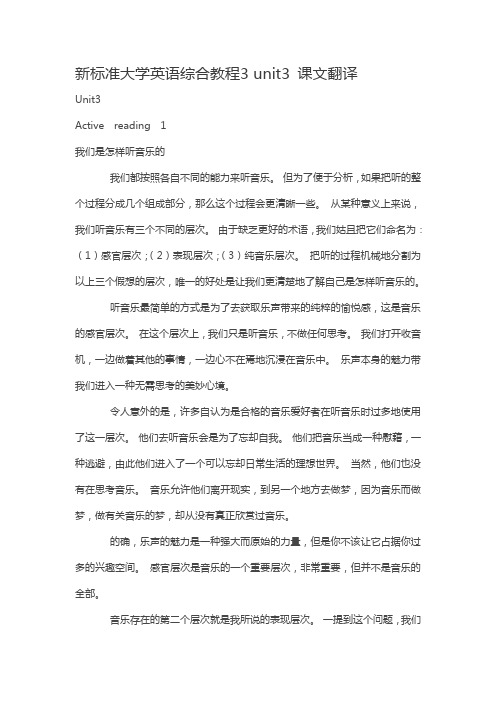
新标准大学英语综合教程3 unit3 课文翻译Unit3Active reading 1我们是怎样听音乐的我们都按照各自不同的能力来听音乐。
但为了便于分析,如果把听的整个过程分成几个组成部分,那么这个过程会更清晰一些。
从某种意义上来说,我们听音乐有三个不同的层次。
由于缺乏更好的术语,我们姑且把它们命名为:(1)感官层次;(2)表现层次;(3)纯音乐层次。
把听的过程机械地分割为以上三个假想的层次,唯一的好处是让我们更清楚地了解自己是怎样听音乐的。
听音乐最简单的方式是为了去获取乐声带来的纯粹的愉悦感,这是音乐的感官层次。
在这个层次上,我们只是听音乐,不做任何思考。
我们打开收音机,一边做着其他的事情,一边心不在焉地沉浸在音乐中。
乐声本身的魅力带我们进入一种无需思考的美妙心境。
令人意外的是,许多自认为是合格的音乐爱好者在听音乐时过多地使用了这一层次。
他们去听音乐会是为了忘却自我。
他们把音乐当成一种慰藉,一种逃避,由此他们进入了一个可以忘却日常生活的理想世界。
当然,他们也没有在思考音乐。
音乐允许他们离开现实,到另一个地方去做梦,因为音乐而做梦,做有关音乐的梦,却从没有真正欣赏过音乐。
的确,乐声的魅力是一种强大而原始的力量,但是你不该让它占据你过多的兴趣空间。
感官层次是音乐的一个重要层次,非常重要,但并不是音乐的全部。
音乐存在的第二个层次就是我所说的表现层次。
一提到这个问题,我们马上就进入到一个颇具争议的领域。
作曲家总是设法避开有关音乐表现方面的讨论。
斯特拉温斯基不是曾经声称他的音乐是一个“物体”,是一件有自我生命的“东西”,除了纯音乐性的存在之外没有任何别的含意吗?斯特拉温斯基这种不妥协的态度可能源于这样的一个事实:有那么多的人尝试着从众多的音乐作品中读出完全不同的含意。
确实,要准确地说出一部音乐作品的含意已经很难了,要肯定并确定地说出来,还要使每个人对你的解释都感到满意,是难上加难。
但我们不该因此走到另一个极端,不能去剥夺音乐“表现”的权利。
【7A文】大学英语三-Unit-3-Why-I-Teach课文及翻译
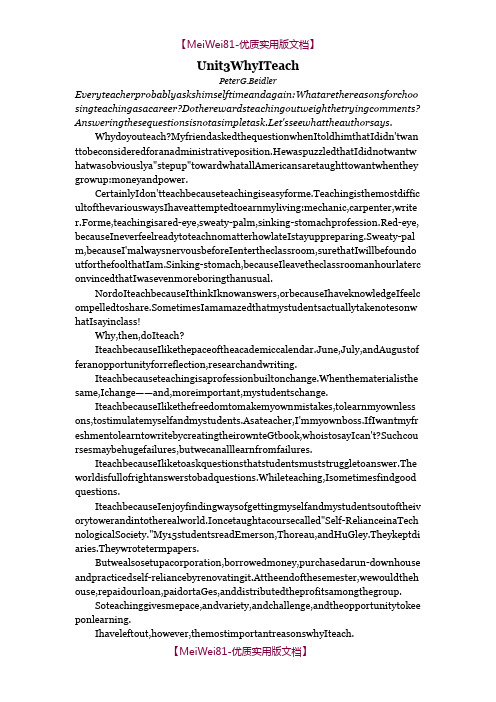
Unit3WhyITeachPeterG.Beidler Everyteacherprobablyaskshimselftimeandagain:Whatarethereasonsforchoo singteachingasacareer?Dotherewardsteachingoutweighthetryingcomments? Answeringthesequestionsisnotasimpletask.Let'sseewhattheauthorsays.Whydoyouteach?MyfriendaskedthequestionwhenItoldhimthatIdidn'twan ttobeconsideredforanadministrativeposition.HewaspuzzledthatIdidnotwantw hatwasobviouslya"stepup"towardwhatallAmericansaretaughttowantwhenthey growup:moneyandpower.CertainlyIdon'tteachbecauseteachingiseasyforme.Teachingisthemostdiffic ultofthevariouswaysIhaveattemptedtoearnmyliving:mechanic,carpenter,write r.Forme,teachingisared-eye,sweaty-palm,sinking-stomachprofession.Red-eye, becauseIneverfeelreadytoteachnomatterhowlateIstayuppreparing.Sweaty-pal m,becauseI'malwaysnervousbeforeIentertheclassroom,surethatIwillbefoundo utforthefoolthatIam.Sinking-stomach,becauseIleavetheclassroomanhourlaterc onvincedthatIwasevenmoreboringthanusual.NordoIteachbecauseIthinkIknowanswers,orbecauseIhaveknowledgeIfeelc ompelledtoshare.SometimesIamamazedthatmystudentsactuallytakenotesonw hatIsayinclass!Why,then,doIteach?IteachbecauseIlikethepaceoftheacademiccalendar.June,July,andAugustof feranopportunityforreflection,researchandwriting.Iteachbecauseteachingisaprofessionbuiltonchange.Whenthematerialisthe same,Ichange——and,moreimportant,mystudentschange.IteachbecauseIlikethefreedomtomakemyownmistakes,tolearnmyownless ons,tostimulatemyselfandmystudents.Asateacher,I'mmyownboss.IfIwantmyfr eshmentolearntowritebycreatingtheirownteGtbook,whoistosayIcan't?Suchcou rsesmaybehugefailures,butwecanalllearnfromfailures.IteachbecauseIliketoaskquestionsthatstudentsmuststruggletoanswer.The worldisfullofrightanswerstobadquestions.Whileteaching,Isometimesfindgood questions.IteachbecauseIenjoyfindingwaysofgettingmyselfandmystudentsoutoftheiv orytowerandintotherealworld.Ioncetaughtacoursecalled"Self-RelianceinaTech nologicalSociety."My15studentsreadEmerson,Thoreau,andHuGley.Theykeptdi aries.Theywrotetermpapers.Butwealsosetupacorporation,borrowedmoney,purchasedarun-downhouse andpracticedself-reliancebyrenovatingit.Attheendofthesemester,wewouldtheh ouse,repaidourloan,paidortaGes,anddistributedtheprofitsamongthegroup.Soteachinggivesmepace,andvariety,andchallenge,andtheopportunitytokee ponlearning.Ihaveleftout,however,themostimportantreasonswhyIteach.OneisVicky.Myfirstdoctoralstudent,Vickywasanenergeticstudentwholabor edatherdissertationonalittle-known14thcenturypoet.Shewrotearticlesandsentt hemofftolearnedjournals.Shediditallherself,withanoccasionalnudgefromme.B utIwastherewhenshefinishedherdissertation,learnedthatherarticleswereaccept ed,gotajobandwonafellowshiptoHarvardworkingonabookdevelopingideasshe' dfirsthadasmystudent.AnotherreasonisGeorge,whostartedasanengineeringstudent,thenswitched toEnglishbecausehedecidedhelikedpeoplebetterthanthings.ThereisJeanne,wholeftcollege,butwasbroughtbackbyherclassmatesbecaus etheywantedhertoseetheendoftheself-reliancehouseproject.Iwasherewhenshec ameback.Iwastherewhenshetoldmethatshelaterbecameinterestedintheurbanp oorandwentontobecomeacivilrightslawyer.ThereisJacqui,acleaningwomanwhoknowsmorebyintuitionthanmostofusl earnbyanalysis.Jacquihasdecidedtofinishhighschoolandgotocollege.ThesearetherealreasonsIteach,thesepeoplewhogrowandchangeinfrontofm e.Beingateacherisbeingpresentatthecreation,whentheclaybeginstobreathe.A"promotion"outofteachingwouldgivememoneyandpower.ButIhavemone y.IgetpaidtodowhatIenjoy:reading,talkingwithpeople,andaskingquestionlike," Whatisthepointofbeingrich?"AndIhavepower.Ihavethepowertonudge,tofansparks,tosuggestbooks,topoi ntoutapathway.Whatotherpowermatters?Butteachingofferssomethingbesidesmoneyandpower:itofferslove.Notonlyt heloveoflearningandofbooksandideas,butalsothelovethatateacherfeelsforthatr arestudentwhowalksintoateacher'slifeandbeginstobreathe.Perhapsloveisthewr ongword:magicmightbebetter.Iteachbecause,beingaroundpeoplewhoarebeginningtobreathe,Ioccasionall yfindmyselfcatchingmybreathwiththem.我为何教书你为什么教书呢?当我告诉我的朋友我不想做任何行政职务时,他向我提出了这个问题。
文学翻译unit 3《翻译方法:如何选择词义》

第二部分翻译方法第三章如何正确选择词义在文学翻译过程中,针对原文的词义正确地选择汉语词义,是保证译文质量的根本一环。
首先一个词在不同的句子中有不同的含义。
1)T h i s g e n e r a l w a s c h a r g e d w i t h t r e a s o n.这个将军被指控犯了叛国罪。
2)T h e C o m m i t t e e d e c i d e d t o p u t P r o f e s s o r H e n r y i n c h a r g e o f t h e r e s e a r c h w o r k.委员会决定让亨利教授负责这项研究工作。
类似短语有t a k e c h a r g e o f,t a k e c h a r g e译为“负责”3)A s s o o n a s t h e m o m e n t f o r t h e g e n e r a l o f f e n s i v e a r r i v e d,t h e s o l d i e r s c h a r g e d t h e e n e m y p o s i t i o n b r a v e l y.总攻时间一到,战士们勇猛地向敌人的阵地冲去。
4)S h e c o m p l a i n e d t h a t s h e h a d b e e n c h a r g e d t o o m u c h.她抱怨说,向她收的费太高了。
5)T h e p o w d e r i n p l a c e,h e r a m m e d i n a l o n g i r o n r o d t o t a m p d o w n t h e c h a r g e..火药装好后,他伸进去一根长铁钎以便把炸药捣实。
6)T h i s s t o r e w i l l c h a r g e t h i n g s y o u b u y,a n d l e t y o u p a y f o r t h e m l a t e r.这家商店将你所买的东西记入账内,让你以后付款。
Unit 3 词法翻译 - 具体法和抽象法
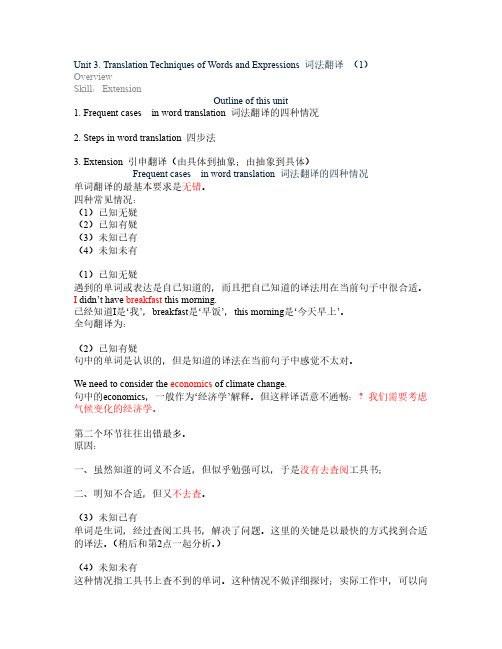
Unit 3. Translation Techniques of Words and Expressions 词法翻译(1)OverviewSkill:ExtensionOutline of this unit1. Frequent cases in word translation 词法翻译的四种情况2. Steps in word translation 四步法3. Extension 引申翻译(由具体到抽象;由抽象到具体)Frequent cases in word translation 词法翻译的四种情况单词翻译的最基本要求是无错。
四种常见情况:(1)已知无疑(2)已知有疑(3)未知已有(4)未知未有(1)已知无疑遇到的单词或表达是自己知道的,而且把自己知道的译法用在当前句子中很合适。
I didn‟t have breakfast this morning.已经知道I是…我‟,breakfast是…早饭‟,this morning是…今天早上‟。
全句翻译为:(2)已知有疑句中的单词是认识的,但是知道的译法在当前句子中感觉不太对。
We need to consider the economics of climate change.句中的economics,一般作为…经济学‟解释。
但这样译语意不通畅:?我们需要考虑气候变化的经济学。
第二个环节往往出错最多。
原因:一、虽然知道的词义不合适,但似乎勉强可以,于是没有去查阅工具书;二、明知不合适,但又不去查。
(3)未知已有单词是生词,经过查阅工具书,解决了问题。
这里的关键是以最快的方式找到合适的译法。
(稍后和第2点一起分析。
)(4)未知未有这种情况指工具书上查不到的单词。
这种情况不做详细探讨;实际工作中,可以向专业人士请教。
…自我开脱‟是翻译不当的原因之一。
这种误区往往是不良习惯造成的,几乎是根深蒂固。
比如不会或不清楚的地方留给老师去改。
要想单词无错翻译就要尽快树立“最后一关”的概念。
译林版四年级下册Unit3(含中文翻译)
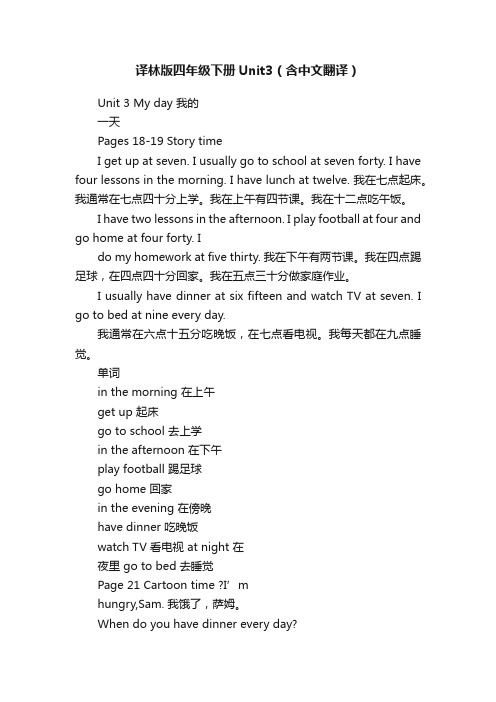
译林版四年级下册Unit3(含中文翻译)Unit 3 My day 我的一天Pages 18-19 Story timeI get up at seven. I usually go to school at seven forty. I have four lessons in the morning. I have lunch at twelve. 我在七点起床。
我通常在七点四十分上学。
我在上午有四节课。
我在十二点吃午饭。
I have two lessons in the afternoon. I play football at four and go home at four forty. Ido my homework at five thirty. 我在下午有两节课。
我在四点踢足球,在四点四十分回家。
我在五点三十分做家庭作业。
I usually have dinner at six fifteen and watch TV at seven. I go to bed at nine every day.我通常在六点十五分吃晚饭,在七点看电视。
我每天都在九点睡觉。
单词in the morning 在上午get up 起床go to school 去上学in the afternoon 在下午play football 踢足球go home 回家in the evening 在傍晚have dinner 吃晚饭watch TV 看电视 at night 在夜里 go to bed 去睡觉Page 21 Cartoon time ?I’mhungry,Sam. 我饿了,萨姆。
When do you have dinner every day?你每天什么时候吃晚饭?At six. 六点.What time is it now? 现在几点了?It’s seven o’clock. 七点钟了。
What can you see over there,Bobby?你能看见有什么东西在那里,鲍比?I can see a cake. 我能看见一个蛋糕。
新目标九年级上unit3 课文重点句子汉译英翻译
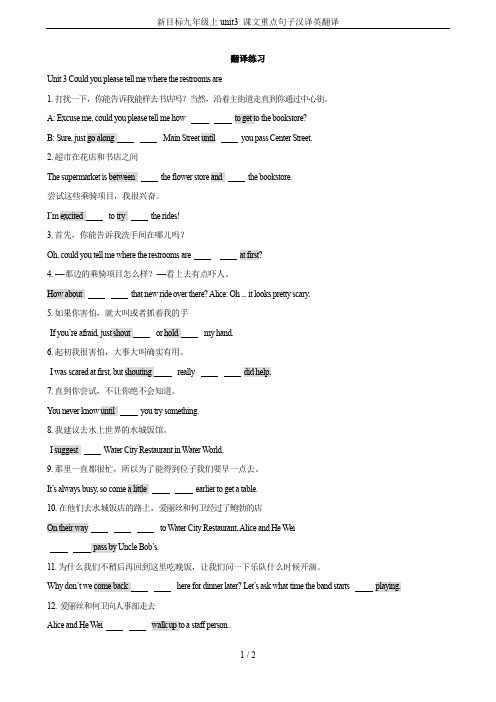
翻译练习Unit 3 Could you please tell me where the restrooms are1.打扰一下,你能告诉我能样去书店吗?当然,沿着主街道走直到你通过中心街。
A: Excuse me, could you please tell me how to get to the bookstore?B: Sure, just go along Main Street until you pass Center Street.2. 超市在花店和书店之间The supermarket is between the flower store and the bookstore.尝试这些乘骑项目,我很兴奋。
excited to try the rides!3. 首先,你能告诉我洗手间在哪儿吗?Oh, could you tell me where the restrooms are at first?4. ----那边的乘骑项目怎么样?----看上去有点吓人。
How about that new ride over there? Alice: Oh ... it looks pretty scary.5. 如果你害怕,就大叫或者抓着我的手6. 起初我很害怕,大事大叫确实有用。
I was scared at first, but shouting really did help.7. 直到你尝试,不让你绝不会知道。
Y ou never know until you try something.8. 我建议去水上世界的水城饭馆。
I suggest W ater City Restaurant in W ater W orld.9. 那里一直都很忙,所以为了能得到位子我们要早一点去。
It’s always busy, so come a little earlier to get a table.10. 在他们去水城饭店的路上,爱丽丝和何卫经过了鲍勃的店On their way to W ater City Restaurant, Alice and He W eipass by11. 为什么我们不稍后再回到这里吃晚饭,让我们问一下乐队什么时候开演。
- 1、下载文档前请自行甄别文档内容的完整性,平台不提供额外的编辑、内容补充、找答案等附加服务。
- 2、"仅部分预览"的文档,不可在线预览部分如存在完整性等问题,可反馈申请退款(可完整预览的文档不适用该条件!)。
- 3、如文档侵犯您的权益,请联系客服反馈,我们会尽快为您处理(人工客服工作时间:9:00-18:30)。
直译 (Literal Translation):就是指译文不但完整而正确地 表达原文的内容,而且还基本上保留原文表达的形式,比 如保留原文所使用的词语、句子结构、修辞手法等,如原 文中的比喻,原文的形象,原文的民族特色等等。 By literal translation, you can get the original meaning preserving the way of expression without destroying the stylistic features and rhetoric images.
Are there any other similar Chinese expressions? Which translation do you prefer?
返回
SECTION 2
5.He walked at the head of the funeral procession, and every now and then wiped away his crocodile tears with a big handkerchief. What is the similar Chinese expression of “crocodile tears ”? A.他走在送葬队伍的前头, 还不时用一条大手绢抹去 他那鳄鱼泪。 B.他走在送葬队伍的前头, 还不时用一条大手绢假惺 惺的抹眼泪。 C. 他走在送葬队伍的前头,做出一副猫哭老鼠的样子搽 眼泪。
返回
SECTION 3
3. Let sleeping dogs lie. A.让睡着的狗躺着。 B别惹麻烦。 4. Love me, love my dog. A.爱我,也爱我的狗吧。 B.爱屋及乌。 5. He who has mind to beat his dog will easily find a stick. A.要想打狗就很容易找到一根棍子。 B.欲加之罪,何患无辞。
返回
SECTION 2
What methods are used to translate the above sentences? What are the language features of different translations?
返回
SECTION 2
chain store/ chain reaction to kill two bids with one stone to shed crocodile tears to freeze someone’s assets to be armed to the teeth Strike while the iron is hot . Fish in troubled water.
返回
SECTION 2
More Practice: to have a correct understanding of the two methods 1.He laughs best who laughs last. A. 他笑得最好,谁笑到最后。 B. 谁笑到最后,谁笑得最好。 Which one is correct? 2.The spoke man has a clever tongue. A.那位发言人有一条聪明的舌头。 B.那位发言人能言善辩。
返回
SECTION 2
You translate the following sentences and phrases, then tell what methods are used ? 1. Confidence in yourself is the first step on the road to success. 自信是走向成功的第一步。 2.Health is happiness. 健康就是幸福。
Unit 3
Basic Translation Methods 翻译的基本方法
返回
Basic Translation Methods
知识目标:1.了解翻译的直译法、意译法。 2.进一步理解语境概念,语境在语义推理中的作用。 3.了解直译和意译的辩证关系。 能力目标:1.能够正确使用翻译的直译法、意译法。 2.能够进行语境判断进行推理选择正确的语义和表达方 式。
返回
SECTION 3
1.What conclusion you may get from the examples offered?
2.What is the final goal of translating ? 3.In order to meet the final goal of translating, what should a translator do? 4.What are features of these translated sentences? How will a target text reader feel reading these translated sentences?
SECTION 4
例1. Turn swords into ploughs. 译文: 化剑为犁。(直译) 意译?化干戈为玉帛。 Which do you prefer, literal or free translation? Why? The factors you consider are just the non-linguistic contextual factors (situational contexts), which influence the way of your expression and decide the result of your translation.
返回
Contents
1 1 2 3 4
Lead-in Practice Literal and Free Translation Conclusion Classic Translation
1 5
返回
SECTION 1
• What are the basic methods of translation?
返回
SECTION 2
More Practice: to have a correct understanding of the two methods 3. The policeman is a dead shot.
•A.那位警察是死射手。 •B.那位警察是神枪手。 •4.You know a word by the company it keeps. •A.你通过它经营的公司来认识词汇。 •B.理解一个词,要看它的结伴关系。 •C.理解一个 词,要看它和哪些词语搭配。
返回
SECTION 3
意译(Free translation): 就是指不拘泥于原文的表达形 式,不受原文所使用的词语、句子结构、修辞手法等如形象, 民族特色等的限制,而只是将原文的意义传达出来的翻译。 By free translation, you get the very true meaning without being confined to the expression of the ST, the images and national features, you just convey the true meaning contained in it according to the custom of TL.
返回
SECTION 4
3.总之,智者见智,仁者见仁。无论使用哪种方法,你还 要考虑译文的可传意性和可接受性。只有意义传达清 楚了,译文读者理解了并接受了, 就是好的译文。 A translator has to consider both the transferability and acceptability of his translation when transferring the meaning from the source text to the target text.
返回
SECTION 3
6.Barking dogs seldom bite. 吠犬不咬人。 隐意:对于发出恐吓,或惯于大声吼叫的人,勿须当真。 7.Every dog has his day. 凡人皆有得意日。 隐意:风水轮流转。 8.Dog does not eat dog. A.狗不会咬狗。 B.同类不相残;同室不操戈。
返回
SECTION 4
1.The two methods are not absolutely contradictory to each other , but supplement and complement each other in practice. The combination of these methods will just make your translation more clear in expressing the original meaning. 直译 和意译兼容并蓄相得益彰。 2.We cannot say which is right or wrong but we can say which one is better in conveying the true meaning contained in the source text.我们不能说哪个对,哪个错,但是可以说哪种方 法更好。
返回
SECTION 2
More Practice: to have a correct understanding of the two methods 5.I knew I never wanted to feel that bad again. I never wanted to have that taste in my mouth, that hole in my stomach. A.我知道我永远也不想再由那种糟糕的感觉,永远不想要 嘴里的那种味道,也不想再患胃穿孔了。 B.我知道我永远也不想再有那种糟糕的感觉,永远不想再 品尝那种滋味,也不想再那么伤心。
